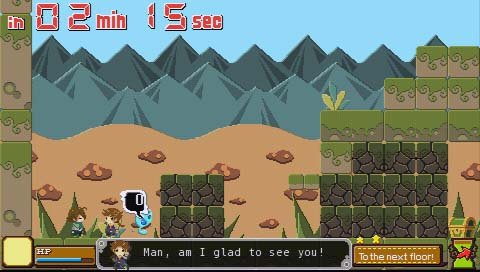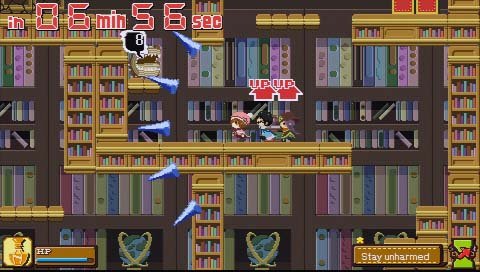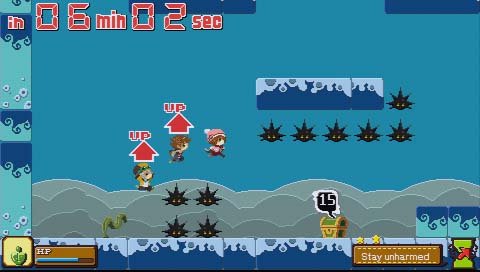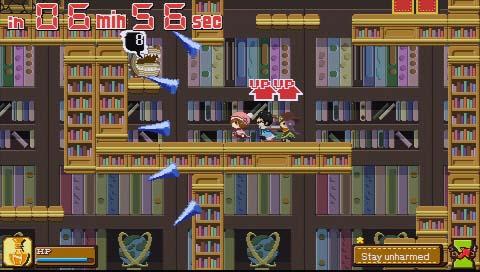GamesRadar+ Verdict
Pros
- +
Cute
- +
beautifully drawn sprites
- +
Cheerful
- +
bouncy music
- +
Constantly changing game experience
Cons
- -
Lack of variety in gameplay
- -
Frustrating dungeon slogs
- -
Hit-or-miss humor
Why you can trust GamesRadar+
Fun trivia: “jikan” is the Japanese word for “time” (don’t say GamesRadar never taught you anything!). Time is also the primary gameplay component of Jikandia: The Timeless Land -almost everything you’ll be doing in this unusual 2D action game revolves around a timer of some sort.
As the game begins, your player character, along with the rest of your schoolmates, is suddenly transported off the train and into the strange land of Jikandia, where time is supposed to not exist – only now it does, and now you and your buddies have to fix things up. The culprit appears to be the King of Time, and finding him will involve exploring a menagerie of differently-themed platforming levels filled with enemies, traps, bosses, and treasures.
But it’s not quite as straightforward as that. You can actually set the amount of time you want to spend in each level, from three minutes up to half an hour – the longer you’re willing to stay, the better the potential scores and loot you can earn. You can choose to tackle the levels with a variety of equippable weapons and enhancements, and also bring along up to two of your rescued classmates to augment your combat power. Each level is split into a multitude of randomly-generated rooms, where your goal is to try to reach the goal door before the time limit is up.

Each room is also filled with enemies, obstacles, items, and treasure chests, many of which also have timers attached that can be manipulated to obtain bonuses. There are also random time-activated events, such as extra enemies appearing or mysterious obstruction-destroying forces in each room, as well as a bonus objective. The bonus objectives range from simply reaching the door successfully to tasks like eliminating all enemies in a room, and should you complete enough objectives successfully, you will gain access to a helpful power boost using the R button. As the clock begins to wind down, you’ll enter a boss room where you’ll have to take down a considerably more powerful foe in order to clear the level and advance the story. It sounds a bit complicated at first, but after a few dungeon runs you’ll start to grok it all.
Jikandia is incredibly enjoyable from an audiovisual standpoint. The game’s sprites are cute, colorful, and appealingly designed, with lots of fun little flourishes and animations that make them stand out as distinct little works of videogaming pixel art. The backgrounds and levels, too, are constructed with a bold, cartoonlike color scheme, and it’s all accompanied by a cheerful, bouncy musical score that will keep you happily hopping along as you slaughter all means of adorable enemies. There’s an equally silly story to go along with the setting, though at times the game’s bizarre and often crude sense of humor (which may well be a byproduct of the English localization) seems at odds with the cute visual imagery.

Unfortunately, the biggest issue with Jikandia is that it’s simply not all that fun to play. Randomly generated levels sound like a nice idea – after all, the concept works well in RPGs, doesn’t it? – but it usually winds up delivering haphazardly constructed mini-levels full of nigh-unavoidable, guaranteed-damage traps and enemies in bizarre, frustrating locations. The simplistic platforming gameplay itself lacks variety as well, and the game’s encouragement to spend more time in a single level often backfires by showing how stale the area’s gimmicks can get within a few minutes. Varied objectives for each room are a nice bonus, but even they will start to repeat after a short while.
On top of it all, character text flashes at the bottom of the screen in each stage while you’re rushing to complete the rooms, meaning you’ll be too busy running around and trying to avoid badly placed hazards to even be able to properly read it. But perhaps the most frustrating aspect is Jikandia’s lack of detailed explanation for a lot of things, leaving the player to have to figure out a lot of the game’s nuances via trial and error. It’s incredibly aggravating when, for example, you can’t proceed to the next stage, but the game will only barely hint as to what you need to do to open it (usually slog through the dungeon you just beat, again).

Jikandia is a visually distinct, charming game that has the potential to be fun in small doses – but since the game design actively discourages you from playing like that, it simply turns into a somewhat-better-than-okay experimental platformer. It’s a shame, too – with a bit of tweaking here and there, it could have been a real sleeper classic. Instead, Jikandia’s essentially destined to spend an eternity as a very niche appeal title.
Mar 22, 2011
More info
| Genre | Action |
| Description | Having all the time in the world isn’t necessarily an awesome thing. |
| Platform | "PSP" |
| US censor rating | "Teen" |
| UK censor rating | "" |
| Release date | 1 January 1970 (US), 1 January 1970 (UK) |



